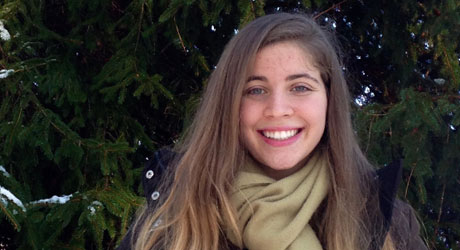By John DiConsiglio
Victoria Gonçalves has followed her political passions through every destination in her life—from her birthplace in Caracas, Venezuela, to her hometown of Miami, Fla., to GW’s Washington, D.C., campus. Championing causes like immigration reform and gender equality, the political science sophomore has eagerly assumed the mantle of student government leader and proud advocate for Latino Americans. And her next stop may well be Capitol Hill.
Her dream job is to be a Congresswoman, she said, and to use her voice in politics to make a difference in people's lives.
She’s off to a good start. Gonçalves has a well-earned reputation as a campus crusader who gets results. And now she has been recognized as one of MSNBC’s “Women in Politics: College Edition,” a web-based series that highlights promising women leaders in student government on campuses across the country. Throughout 2014, MSNBC editors and political commentators identified future movers-and-shakers from female college activists, highlighting their accomplishments and soliciting their voices for online discussions of female candidates and women’s issues on a national level.
“I'm really excited about corresponding with the other women who have been chosen and talking to them about the issues they are working on at their colleges,” she said. “I’d like to compare notes on how we are all trying to enact change.”
Gonçalves is making a difference on campus—both as a senator on the GW Student Association and an executive board member with the GW chapter of the Organization of Latino American Students (OLAS). She sponsored a Student Association bill to create a student-run peer support hotline for young people who are hesitant to approach counselors or professionals with a problem. She is working with the OLAS to start a Latino student mentorship program. During GW's Latino Heritage Celebration in October, Gonçalves organized a panel discussion on the Latino vote in the 2014 elections, bringing College Democrats and College Republicans together for a bi-partisan debate.
“It’s easy to get students to sit together and identify a problem, but the tough part is coming up with real solutions,” she said. “A big challenge that I’ve faced has been turning great conversations about challenges that students are having into real actions.”
Gonçalves’s parents came to the U.S. from Venezuela on work visas in 2001, when Gonçalves was in the first grade. As a child growing up in Miami, her eyes were opened to the impact of politics on real lives. Many of her family’s friends were undocumented immigrants, living under the constant shadow of deportation. “I’ve known since I was in elementary school that [my friends] did not have the same opportunities as I because they were undocumented,” she recalled. “I’ve seen mothers and fathers and children…deported, and I can honestly say that there is nothing more heartbreaking than the despair in their eyes.”
Spurred by the plight of undocumented immigrants struggling to forge a life in the U.S., Gonçalves is outspoken in her support of comprehensive immigration reform. In Miami, she tirelessly volunteered on voter-registration drives for newly naturalized citizens. Through her campus activism, she has advocated for issues like extending financial aid benefits to undocumented immigrants and their children who want to attend four-year universities.
Gonçalves has always marched to her own political drummer. While her peers flocked to pop, rap and salsa music, she was drawn to the 1960s and ’70s protests songs of artists like Bob Dylan. “The fact that there was a whole generation that was committed to questioning the status quo in order to fight for equal rights…is incredibly inspiring,” she said. Her heroes are political pioneers who champion gender and race equality, such as Hillary Clinton and MSNBC commentator Melissa Harris-Perry. “My GW courses have also inspired me to continue fighting for social justice,” she said, singling out Associate Professor of American Studies Elaine Peña’s Latinos in the U.S., and Associate Professor of Political Science Ismail White’s African American Politics.
Gonçalves is on a path to turn her education into activism, aspiring to eventually work as a candidate’s campaign manager—or even hold public office herself. For now, she has set her sights on the biggest landmark in her life: This year, she will officially become a U.S. citizen.
“I feel incredibly blessed to be where I am today and to be able to say that I will be a citizen,” she said “I’m so excited to be able to vote and participate democratically in this country that I love so much.”


